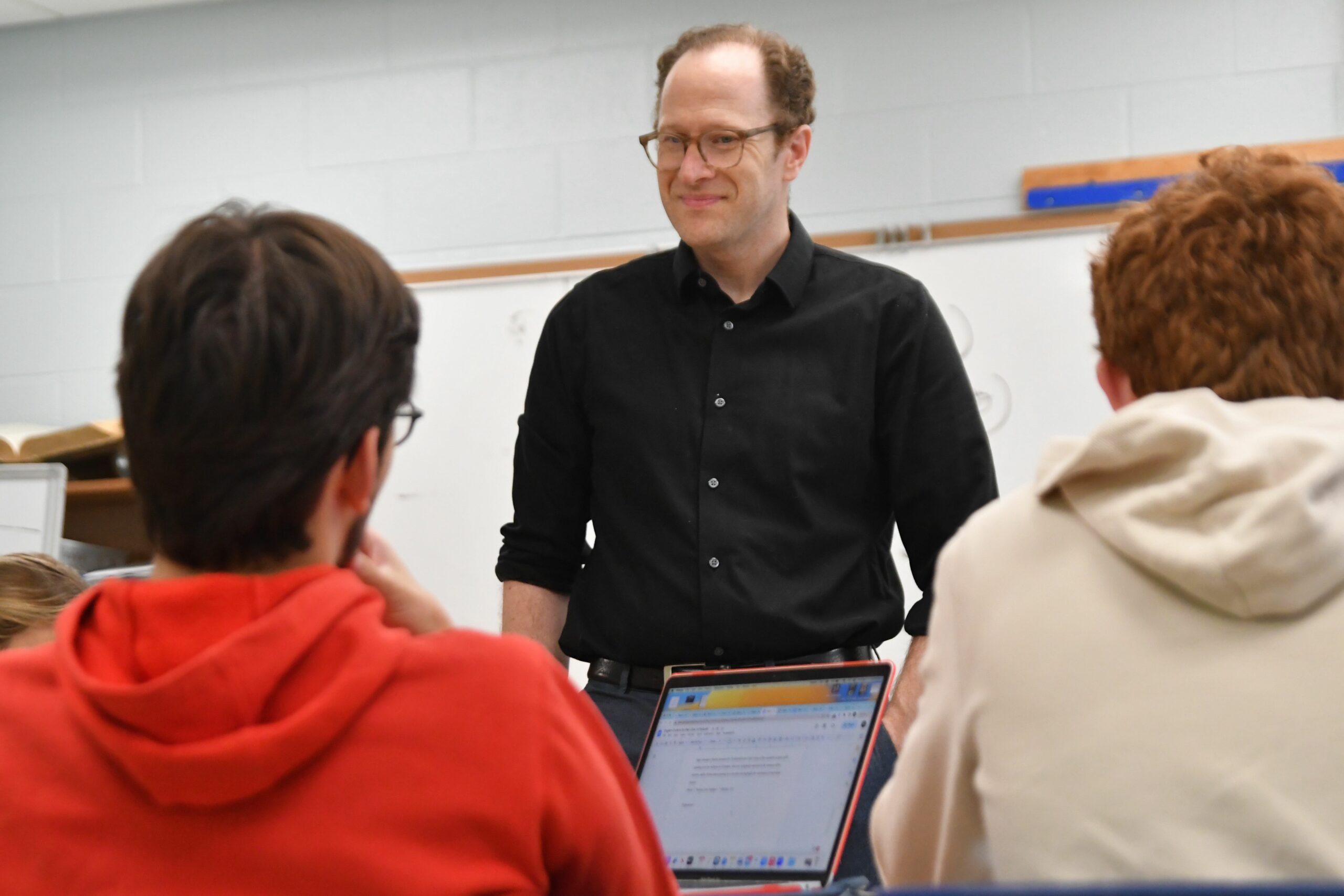The world of education is constantly evolving, and with the advent of new challenges and opportunities, such as AI, teaching is an indispensable art form that requires creativity, innovation, and a commitment to growth. In this month’s CTTL blog, we have the pleasure of diving into the thoughts and experiences of a prominent teacher at St. Andrew’s Episcopal School, Andrew Seidman, as he sheds light on the changing landscape of education. Buckle up and get ready to glean insights and inspiration from this seasoned educator!
Teaching: A Passion that Transcends Everything
Andrew Seidman’s journey as an educator began 17 years ago. With a passion for literature, language, and psychology, he has garnered a wealth of experience teaching high school English 10 Honors, AP English Language and Composition, and AP Psychology. For Andrew, teaching is more than just conveying content; it is about inspiring a love for learning and creating an environment where students can thrive.
“As a teacher, my primary goal is to empower my students to become lifelong learners,” Andrew shared. “I want to instill in them a passion for discovery, a curiosity about the world, and a desire to grow both intellectually and emotionally,” he continued. “I really think that what success for me looks like is that you’ve developed somebody who is a scholar. A scholar understands that the process of education and asking deep and important questions is not something that just happens in a classroom or over the course of a period. It’s something that happens in the real world and happens over the course of life. Scholars are people who value education, not because of the A+ or the 100. They value education because it provides them a unique and richer perspective of the world. I want to make scholars.
Reflection and Development:
Over the years, Andrew’s role as an educator has expanded. He is a mentor and coach to his colleagues and has served as a Translation Group Leader for the CTTL’s Science of Teaching & Leadership Academy since the program’s beginning. One of Andrew’s strengths is that he is relatable. In reflecting on his experience, he shares some insights on what he would have said in conversation with his younger self.

“First thing, I would try to remind myself,” he imagined. “Don’t be afraid to try something new. You don’t have to do something one way just because you’ve been doing it that way the whole time. The second thing I think I would say to myself is to calm down; students are going to forget and stumble along the way, and it’s OK,” he explained. “Avoid what’s called the fluency of knowledge – the idea that students think they understand immediately after they’ve learned something. If it appears that things are a little rusty for my students, it means it is a good time to retest and restudy. Real learning occurs when information sticks with them through the long term, and the progression of drawing information out of their memory is actually the process of learning.”
Andrew went on to explain how he continues to lean on The Placemat: MBE Strategies for Teaching & Learning—a tool developed by the teacher-led CTTL—at times when things aren’t going so well in the classroom.
“I think the MBE Placemat continues to be one of the most helpful tools to me as a teacher in terms of making me think about my own lesson planning,” he said. “It lays out a lot of the strategies that you might want to try when things aren’t going well in your class. It reminds you about offering constrained choices, using formative assessments, and having students engage in their own metacognition.”
“As a teacher, you want to remain humble, you want to be up to date on the latest research, but you also need to understand it’s fluid,” he continued. “I mean, there’s always more to learn, and that’s a good thing. You’re not going to learn everything; you’re not going to be able to do everything or try every strategy on The Placemat. However, if you can just change 10 % of the things that you do research-informed from year to year, that’s a pretty manageable goal.
Curriculum Development: Paving the Way for Future Success
Andrew emphasized that teaching should go beyond memorizing facts and figures; it should equip students with the skills they will need to succeed in life. He believes in the importance of creating a well-rounded and challenging curriculum that prepares students for the future.
“As educators, we have a tremendous responsibility to ensure our curriculum is rigorous and relevant,” Andrew noted. “We need to equip our students with critical thinking skills, problem-solving strategies, and the ability to collaborate effectively,” he continued. “First, you need to know what your students know and what they don’t know before they begin the process.”
“So, part of the teaching is formative assessments to determine what they don’t know. Then giving them the strategies to get them to draw what they have been taught out of their memory again and again. The more often they’re able to do that over a long period of time, the more durable that knowledge is. We want them to carry these skills forward and to then apply the strategies that they used over the course of their academic lives. That’s really the difference between somebody who’s a student and somebody who’s a scholar.”
“The MBE Placemat gives you that reminder, and how you tailor it to your classroom is up to you and the situations that you find yourself in. For example, students aren’t quite nailing the thesis sentence for the AP Language analysis essay. I think to myself ‘What is something that I could do to help?’ and I sort of look over The Placement, the things that might be going on, and I may say to myself, ‘I wonder if I offer an additional scaffold if that’ll help them reach that curricular goal?’”
“If that works, I’ve discovered the strategy that’s useful,” he explained. “Then, I can slowly begin to remove that scaffold as they get more comfortable with writing thesis statements. On the other hand, I can imagine situations in which maybe it’s an individual student and it’s a strategy just for them. So, for example, I might have a student who is really struggling with remembering the parts of the brain. One of the suggestions in the Placemat is that it’s important to chunk information. So, I might recommend that the individual student try a mnemonic device. So, let’s say they’re trying to remember the lobes of the brain, maybe they need the mnemonic device Freud Tore Off Pants (for the parts of the brain – frontal, temporal, occipital, parietal). The prompts and reminders to do these things come from The Placement. But the magic happens with you as a teacher, thinking about your own individual students in your own classes, and the context in which you’re applying a strategy.”

Learning and the Brain: A Fascinating and Complex Relationship
Another crucial aspect of our conversation with Andrew was professional and relational development. He prefaced his comments by stating that understanding how the brain processes information is essential in creating an environment where students can thrive. But teachers aren’t the only stakeholders in a student’s education that should be aware of how the brain learns. He stressed how important it is for parents to know how the brain learns as well, especially in the current landscape of education.
“We need to be knowledgeable of how the brain learns, which strategies are effective, and how to utilize that knowledge to create an environment that fosters growth and success,” he noted. “As we look at the macro level of what’s going on right now in society and education, I think there are different challenges. Teacher burnout is big. We really need to get back to emphasizing the roles that parents and teachers play in a child’s education, the importance of those roles, and the partnership that exists between those roles. I think feeling respected and valued by parents would really help with teacher burnout and it would help parents if they understood the strategies behind why teachers make the choices they do,” he continued.
Andrew addressed the role that recent technological advances have played in today’s classrooms and the challenges it can pose.
“We have enabled more people to do amazing things with technology. For example, we have AI, social media, and advances in programming. The CTTL and MBE research and strategies are providing excellent frameworks for how students are learning information. However, we need to emphasize the humanities field where we ask questions about ‘Why we do the things we do?’, ‘Should we do the things we do?’. Today, the challenges are myriad, and there are larger cultural challenges at play. But one way or another, we’re going to have to face those challenges and good teachers will be best prepared to do it.
Advice to Aspiring Teachers: Embrace the Power of Teaching
As we wrapped up our conversation, Andrew left us with a few words of advice for teachers and school leaders:
“Teaching is a profession that requires dedication, passion, and a willingness to learn. Never stop learning, always be open to new ideas,” Andrew shared.
“I have been a translation group leader for the summer Academy since its inception (in 2017), and it’s great to be able to make connections with teachers, from different schools, backgrounds, subject matter, and geographical areas, but who are all deeply committed individuals who really want to be the best teachers they can possibly be. It’s exciting to expose them to MBE strategies, hear about how they’re going to use them in their classrooms, and to help them plan for that. I really enjoy touching base with them through virtual office hours or virtual sessions as their academic year goes on to see how they’re doing.”
He continued, “One of the reasons I really value the Academy is because it keeps me fresh. Summer is a good time to recharge, but you also need to keep your eye on the ball a little bit. And the Academy is one of those things that helps me kind of refocus my energies as a teacher and think about my own teaching practices, what I’m going to try this year and what strategies might work for me.”
Andrew Seidman’s journey serves as a poignant reminder that teaching is not just a profession, but a journey that requires dedication, creativity, and a willingness to grow. With his insights and experiences, we have the opportunity to learn from one of the veteran teachers here at
St. Andrew’s and understand the nuances that set exceptional teachers apart.




